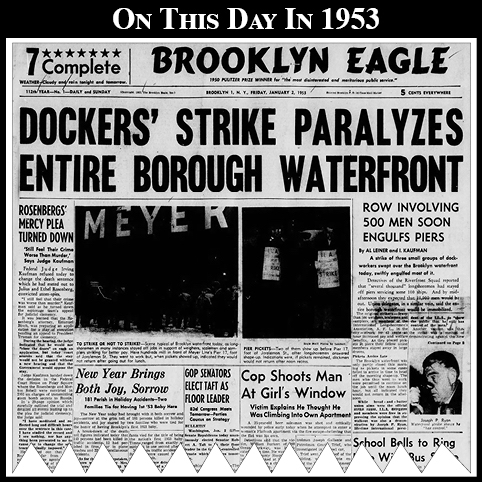January 2: ON THIS DAY in 1953, Dockers strike paralyzes Brooklyn waterfront

ON THIS DAY IN 1953, the Eagle reported, “A strike of three small groups of dockworkers swept over the Brooklyn waterfront today [and] swiftly engulfed most of it. Detectives of the Riverfront Squad reported that ‘several thousand’ longshoremen had stayed off piers servicing some 100 ships. And by midafternoon they expected that 10,000 men would be out. Union delegates, in a similar vein, said the entire borough waterfront would be immobilized. The original strikers – fewer than 500 weighers, scalemen and samplers, all members of the International Longshoremen’s Association, A.F.L., in the city – struck for 42 cents an hour increased pay and welfare benefits. As they placed pickets at piers, their fellow union members stayed away in large droves. The Brooklyn waterfront was only partly closed this morning as pickets in some cases failed to arrive in time to head off the morning shape-up. The men who thus went to work were permitted to continue on the job until the noon lunch hour, but all indicated they would not return in the afternoon.”
***
ON THIS DAY IN 1902, the Brooklyn Daily Eagle reported, “Have heard of provincials who never rode on a train and considered the telephone a delusion worthy of Munchausen. These people, however, are metropolitan when compared with some of our Western compatriots. They positively don’t know out there that the football season is over. University of Michigan and Leland Stanford elevens played yesterday at Pasadena, Cal., while here the new year turned such a cold shoulder to us that we dreamed yearningly of purgatorial furnaces. Happy people out there with fifty-two weeks of summer and one day of winter to the year.” The Michigan Wolverines defeated Stanford University 49-0 in the first Rose Bowl Game.

Brooklyn Boro
View MoreNew York City’s most populous borough, Brooklyn, is home to nearly 2.6 million residents. If Brooklyn were an independent city it would be the fourth largest city in the United States. While Brooklyn has become the epitome of ‘cool and hip’ in recent years, for those that were born here, raised families here and improved communities over the years, Brooklyn has never been ‘uncool’.